Jülich Citizens' Jury recommends standing citizens' jury

The formation of a standing citizens' jury for Jülich is one of the proposals of a randomly selected citizens' jury held in Jülich on 3 and 4 September 2021. "Making our food sustainable, avoiding packaging, promoting biodiversity. How can we contribute to a sustainable lifestyle in Jülich?" This was the question posed by the city's first citizens' jury.
Jülich wants to transform itself into a modern, sustainable and future-oriented city. This includes, among other things, attractive, natural green and open spaces where young and old like to spend time, short distances that are easy to cover on foot or by bike, high-quality, regional food in the shops. In this way, the city wants to contribute to structural change and climate protection.
Citizens develop proposals
The municipality wants to know how it can offer the best possible support in this regard. Various concepts for sustainability, mobility and an integrated action concept for the city centre are already being developed. Now citizens have developed concrete suggestions and wishes for what sustainable living in Jülich could look like and what they would like to see in terms of support.
To this end, the city invited 12 randomly selected residents to form a citizens' jury, which is to help shape the transformation of the city with its suggestions and contributions. The city of Jülich is working together with the Ruhr University Bochum (Centre for Environmental Management, Resources and Energy/CURE) and the BioeconomyREVIER Rheinland coordination office of the Research Centre Jülich (FZJ).
Discussion in citizens' café
The results of the Jülich Citizens' Jury were presented to all other interested citizens, experts and politicians in a Citizens' Café on 16 September 2021 and handed over to Mayor Axel Fuchs. All interested parties were invited to discuss the results together, express their opinion on them and make suggestions for improvement.
Among other things, the citizens' jury proposed the creation of a safe cycle path network consisting of wide, level, illuminated and continuous paths. Direct train connections to Aachen, Cologne and Düsseldorf as well as to the Jülich Research Centre and between the Research Centre and Brainenergy Park are also desired. The villages should be connected to a reliable and cost-effective public transport network. For motorised traffic, the city is to get a concept for traffic reduction in the city centre, where 30 km/h speed limits are to apply. Means of transportation are to be shared, and traffic through the city is to be routed via a closed ring road.
Green Jülich
Green roofs and green front gardens are to become an integral part of the city according to the proposals of the citizens' jury. Low-cost housing and sports facilities, quiet areas and clean toilets are desired. Market Square and Castle Square are to be rebuilt and revitalised. Flood drainage areas should remain undeveloped.
In order to be inviting and citizen-friendly, Jülich should have a centrally located information and service centre, also for tourists. The city administration is to be comprehensively digitalised, and all citizens are to receive reliable and fast internet.
Climate and environmental protection
For a climate- and environment-friendly Jülich, flower strips are to be planted in fields and green spaces are to be made insect-friendly. Citizens should be able to plant tree grates and tend flower beds, and gravel gardens should be banned.
The jury participants want Jülich to be plastic-free. The city should have a deposit and return system for all kinds of packaging. In cooperation with research institutes and industry, the city should become a model municipality for the production of products from bio-economic manufacturing methods. A department store in the city centre should offer unpackaged and regional products. Kindergarten children should be offered healthy, environmentally friendly and regionally produced food. A new goal is to be set each year on an environment day that is obligatory for schools, administration, trade, industry and all institutions.
New use of the opencast mine
With regard to the nearby open-cast mine, the Citizens' Jury would like to see it used as a lake or recreational area. A clear concept for the indoor swimming pool and the use of solar energy is also necessary. They also want energy advice and food buses in the villages.
Since the participants in the citizens' jury liked their instrument of democracy, they suggested setting up a standing citizens' jury. Such citizens' assemblies already exist in the German-speaking Community in East Belgium and in the London Borough of Newham. They are based on a general regulation by law or statute. Mayor Fuchs spoke out against the installation of a standing citizens' jury, but suggested using sortition for other citizens' juries in the future and asking their opinion.
More information: Citizens' Jury "Sustainable living in Jülich"